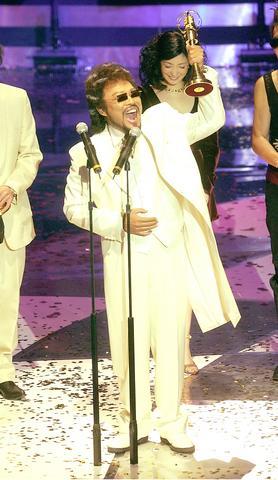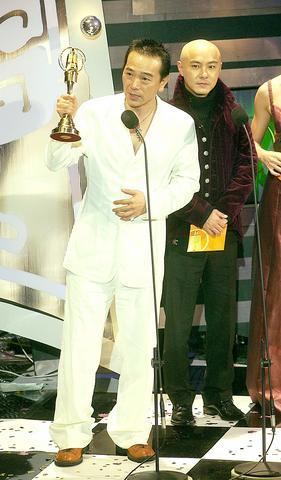Public Television Service (
PTS won in 11 award categories. The best lead actor honor went to Chang Chen-kuang (

PHOTO: TAIPEI TIMES
The awards ceremony took place last night at Sun Yat-sen Memorial Hall in Taipei, and opened with a star-studded red-carpet walk that drew hundreds of fans.

PHOTO: TAIPEI TIMES
Croatian pianist Maksim, Korean actors Ahn Jae-wook and Ha Ji-won, both of whom have large fan bases in Taiwan for their TV dramas, pop diva Stefanie Sun (
The four-hour gala event was hosted by Kevin Tsai (
PTS demonstrated its power for producing quality programs at the Golden Bell Awards -- Taiwan's answer to the Emmy Awards -- especially in drama and cultural programming.
The TV company took home four awards for its programs, including the best TV drama Banquet (
PTS won 18 award categories at Golden Bell Awards last year, well ahead of all the other TV stations in Taiwan.
In the variety show categories, Taiwan's veteran TV host Chang Fei (張菲) won the award for the best TV host for variety shows for his popular show Variety Big Brother (綜藝大哥大). The award for best variety program, however, went to Variety Sum-up (綜藝大集合).
Having hosted TV shows for 30 years, Chang expressed his gratitude to all his guests who have been entertained and "tortured" in his shows. He also gave thanks to his alleged girlfriend from Belarus, Margarita, who serves as the assistant hostess and comedienne in his show.

Towering high above Taiwan’s capital city at 508 meters, Taipei 101 dominates the skyline. The earthquake-proof skyscraper of steel and glass has captured the imagination of professional rock climber Alex Honnold for more than a decade. Tomorrow morning, he will climb it in his signature free solo style — without ropes or protective equipment. And Netflix will broadcast it — live. The event’s announcement has drawn both excitement and trepidation, as well as some concerns over the ethical implications of attempting such a high-risk endeavor on live broadcast. Many have questioned Honnold’s desire to continues his free-solo climbs now that he’s a

Francis William White, an Englishman who late in the 1860s served as Commissioner of the Imperial Customs Service in Tainan, published the tale of a jaunt he took one winter in 1868: A visit to the interior of south Formosa (1870). White’s journey took him into the mountains, where he mused on the difficult terrain and the ease with which his little group could be ambushed in the crags and dense vegetation. At one point he stays at the house of a local near a stream on the border of indigenous territory: “Their matchlocks, which were kept in excellent order,

Jan. 19 to Jan. 25 In 1933, an all-star team of musicians and lyricists began shaping a new sound. The person who brought them together was Chen Chun-yu (陳君玉), head of Columbia Records’ arts department. Tasked with creating Taiwanese “pop music,” they released hit after hit that year, with Chen contributing lyrics to several of the songs himself. Many figures from that group, including composer Teng Yu-hsien (鄧雨賢), vocalist Chun-chun (純純, Sun-sun in Taiwanese) and lyricist Lee Lin-chiu (李臨秋) remain well-known today, particularly for the famous classic Longing for the Spring Breeze (望春風). Chen, however, is not a name

Lines between cop and criminal get murky in Joe Carnahan’s The Rip, a crime thriller set across one foggy Miami night, starring Matt Damon and Ben Affleck. Damon and Affleck, of course, are so closely associated with Boston — most recently they produced the 2024 heist movie The Instigators there — that a detour to South Florida puts them, a little awkwardly, in an entirely different movie landscape. This is Miami Vice territory or Elmore Leonard Land, not Southie or The Town. In The Rip, they play Miami narcotics officers who come upon a cartel stash house that Lt. Dane Dumars (Damon)